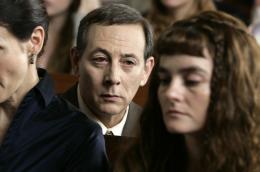Equal Sequel?
Todd Solondz pictures are not popular. He tells stories of odd people in depressing situations. But there was a short period in the 90s when it looked like he might be capturing the zeitgeist. Welcome To The Dollhouse (1995), a low budget film (all his films are low budget) about a 7th-grade girl living a miserable life, made four and a half million dollars. His follow-up, Happiness (1998), so hot to handle it almost wasn't released (one character was a semi-sympathetic pedophile), grossed close to three million.
Since those art house "hits" his audience has abandoned him. Storytelling (2001) made less than a million and Palindromes (2004) made only a bit more than half a million.
It looks like his latest, Life During Wartime, may sink without a trace. I went to see it opening weekend. It was playing in only two theatres yet attendance was sparse.
But who cares. The question should be is it any good? Well, the film is odd in that it's an unofficial sequel to Happiness. It follows the same characters, some years later. Except the roles are played by different actors.
Happiness was quite memorable. I only saw it once, but quite a few moments I still recall vividly. The sequel refers to what happened, but Solondz doesn't care if you've seen Happiness. He might even like it if his audience sees these characters as new. Unfortunately,
 I find Life During Wartime inferior in almost every way. We've still got all the creepy character in unpleasant situations, but they no longer seem fresh. Also, in most instances, the new actors are worse (for these roles) than the originals.
I find Life During Wartime inferior in almost every way. We've still got all the creepy character in unpleasant situations, but they no longer seem fresh. Also, in most instances, the new actors are worse (for these roles) than the originals.I'd rather Solondz try something completely new than retreat to old concepts. (I'm sure he thinks he's doing something new, but all I can say is it didn't seem new enough.)
Which is why I'm so confused by Anthony Lane's praise in The New Yorker:
...the movie, his best to date, and a sequel of sorts to “Happiness,” feels drenched in an unfamiliar sadness, as his characters feel the past surging in upon them and the hopes of the future receding before their gaze. “Down here it’s easy to forget everything,” Trish (Allison Janney) says, of her existence in Florida, but she’s kidding herself; nothing, in Solondz’s world, is harder than forgetting, except the will to forgive.
Allison Janney does a solid job, but I find her scenes a good example of how Life During Wartime is inferior. She's a little too open about sex with her 12-year-old son. It's hard to buy. And the scene with her son, where she talks about pedophilia, just doesn't play. Her character managed to be both too obvious and too unclear about what was going on. Compare this to Happiness, where Dylan Baker, who's been caught molesting his son's friend, explains to his son why he does what he does. It's not only a powerful scene, it's also a moment where you realize you're watching something you've never seen before. Too much of Life During Wartime plays like a parody of the first film, while the rest feels like a tired repeat.

0 Comments:
Post a Comment
<< Home